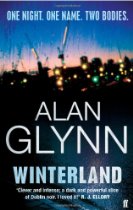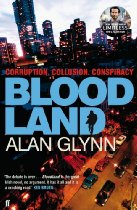The question. It can come at you anywhere, at any time, in a taxi, at a party, as you wait to pick up your kids from school. What do you do? If the answer is, I’m a writer, then the inevitable, perfectly logical follow-up question will be, Oh, what kind of stuff do you write? Logical, maybe, but for some reason, I’ve always struggled to provide a satisfactory answer. Mostly, I’ll say, crime fiction, and mostly that’s fine. But with a little further interrogation things can get knotty. You don’t write mysteries or police procedurals? You don’t write about serial killers or child abusers? You don’t have a series character? So what kind of crime fiction do you write? At this point I’ll squirm and say, I don’t know . . . I write thrillers?
I think the problem, in part, has to do with being Irish. When I started out there was little or no genre fiction being written in Ireland. If you wanted to be a writer in those days – any time, let’s say, before the mid to late nineties – you had to come to terms with the pantheon at your back, with Beckett, Joyce, Yeats, Wilde, the giants, the usual suspects. If you weren’t at least trying to write a literary masterpiece consisting of elliptical, shimmering sentences, then you were pretty much wasting your time. I grew up reading genre fiction, but it was stuff by and about and for other people, Americans, the English. Not us. We didn’t do that.
But help was at hand. In 1998 Mary, Mary by Julie Parsons was published and then, the following year, John Connolly broke ranks by starting his Charlie Parker series. Suddenly, all sorts of new stuff was possible, the Green Streets were opening up . . . and the rest (already? so soon?) is history.
 I wasn’t out of the woods yet, though. My first two novels (still languishing in a drawer), weren’t quite one thing or the other, couldn’t quite be pigeonholed – which is something that publishers really don’t like. My next novel, The Dark Fields (later re-issued as Limitless), did make it out of the drawer and over the line, but it still suffers a bit from PDS – Pigeonholability Deficit Syndrome. It is variously described as a techno-thriller, a psychological thriller, a conspiracy thriller and an SF novel. Personally, I don’t care what people call it, so long as they read it.
I wasn’t out of the woods yet, though. My first two novels (still languishing in a drawer), weren’t quite one thing or the other, couldn’t quite be pigeonholed – which is something that publishers really don’t like. My next novel, The Dark Fields (later re-issued as Limitless), did make it out of the drawer and over the line, but it still suffers a bit from PDS – Pigeonholability Deficit Syndrome. It is variously described as a techno-thriller, a psychological thriller, a conspiracy thriller and an SF novel. Personally, I don’t care what people call it, so long as they read it.
But maybe I wasn’t helping matters much by going on to write Winterland, which was pretty far from anything techno or SF. It’s still a thriller, though. Psychological, anyone? Conspiracy? Business? In any case, whatever genre, or even sub-genre, Winterland may occupy, or may be assigned, I think it’s safe to say that my latest novel, Bloodland, will be keeping it company, as will its successor, Graveland. A loose trilogy, these books may still legitimately be diagnosed with mild PDS, but as I move on now to the third installment I feel a growing conviction that the right term to describe them – the right genre, or sub-genre – is political thriller.
 This shouldn’t come as much of a surprise to me. I follow what’s going on and have views, but I’m not so much a political junkie as someone hooked on the inherent drama of politics. I’ve always preferred Shakespeare’s history plays to the tragedies or comedies, because they are so rich in political intrigue. I’m a big fan of Trollope’s Palliser novels. Easily one of the finest, most compelling books I’ve ever read is Robert Caro’s Means of Ascent, his epic account of Lyndon B. Johnson’s 1948 senate election victory over Coke Stevenson. I’m a sucker for anything Kennedy-related, what my friend Declan Hughes calls Hyannis Porn. I was fourteen when Nixon resigned and remember it all so vividly. (I still check periodically to see if Washington Behind Closed Doors has become available yet on DVD – maybe there’s a reason it hasn’t, maybe it doesn’t hold up, but Jason Robards as Richard Monckton? Come on). I loved I, Claudius and House of Cards, and even though The West Wing is a bit too much of a wet liberal’s wet dream, a regular Little White House on the Prairie, Aaron Sorkin’s dialogue is complex and dense and very often just plain mesmerizing. Then there’s Blake Masters’s Brotherhood, with Tommy Caffee’s long rise to power in Providence. And what is the five-season arc of The Wire if not one of the greatest political dramas ever made?
This shouldn’t come as much of a surprise to me. I follow what’s going on and have views, but I’m not so much a political junkie as someone hooked on the inherent drama of politics. I’ve always preferred Shakespeare’s history plays to the tragedies or comedies, because they are so rich in political intrigue. I’m a big fan of Trollope’s Palliser novels. Easily one of the finest, most compelling books I’ve ever read is Robert Caro’s Means of Ascent, his epic account of Lyndon B. Johnson’s 1948 senate election victory over Coke Stevenson. I’m a sucker for anything Kennedy-related, what my friend Declan Hughes calls Hyannis Porn. I was fourteen when Nixon resigned and remember it all so vividly. (I still check periodically to see if Washington Behind Closed Doors has become available yet on DVD – maybe there’s a reason it hasn’t, maybe it doesn’t hold up, but Jason Robards as Richard Monckton? Come on). I loved I, Claudius and House of Cards, and even though The West Wing is a bit too much of a wet liberal’s wet dream, a regular Little White House on the Prairie, Aaron Sorkin’s dialogue is complex and dense and very often just plain mesmerizing. Then there’s Blake Masters’s Brotherhood, with Tommy Caffee’s long rise to power in Providence. And what is the five-season arc of The Wire if not one of the greatest political dramas ever made?
 Maybe that’s expanding the term too much, but I think it can take the pressure. Politics isn’t just what politicians do in congress or in parliament. It’s about power in society, who has it and how it is wielded – and that includes conspiracies, shenanigans, nefarious business dealings, criminal activity, the lot. Prime ministers and senators stalk the pages of Winterland and Bloodland, but so do property developers and corporate CEOs, media operators and ordinary citizens caught in the crossfire of high-level power plays.
Maybe that’s expanding the term too much, but I think it can take the pressure. Politics isn’t just what politicians do in congress or in parliament. It’s about power in society, who has it and how it is wielded – and that includes conspiracies, shenanigans, nefarious business dealings, criminal activity, the lot. Prime ministers and senators stalk the pages of Winterland and Bloodland, but so do property developers and corporate CEOs, media operators and ordinary citizens caught in the crossfire of high-level power plays.
Winterland is an Irish political thriller with an international dimension, and Bloodland is an international political thriller with an Irish dimension. But they’re both political thrillers. Apparently. Because that, you see, is the kind of stuff I write.
CLICK HERE TO BUY ALAN GLYNN's BOOKS FROM AMAZON